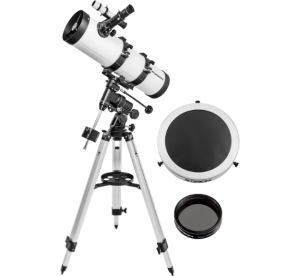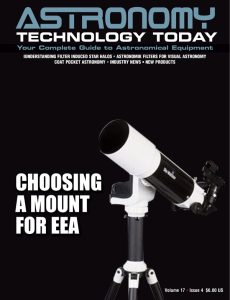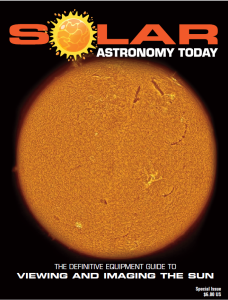Orion Telescope and Binoculars is making available a lineup Orion Observer Refractor Sun and Moon Kit telescope combinations. These equatorial refractors come in 90mm, 114mm and 134mm configurations.
 For solar observing, each kit includes a full aperture film solar filter that fits over the front of the telescope. This Orion white-light solar filter is designed to see sunspots and granulation around the sunspots on the solar disk. The solar filter rejects all harmful light from the Sun, while allowing a very small fraction of light to pass through, so you can safely enjoy daytime solar astronomy.
For solar observing, each kit includes a full aperture film solar filter that fits over the front of the telescope. This Orion white-light solar filter is designed to see sunspots and granulation around the sunspots on the solar disk. The solar filter rejects all harmful light from the Sun, while allowing a very small fraction of light to pass through, so you can safely enjoy daytime solar astronomy.
For lunar viewing, the kit also includes a glare-reducing and contrast boosting moon filter to better observe the details of the Moon. The filter blocks 87% of the Moon’s brightness to provide a more comfortable view and reveal subtle details. It’s a neutral density filter that will not alter the natural color of the Moon.
Each kit comes with an equatorial mount and tripod. The kit also includes 25mm and 10mm 1.25″ Plossl eyepieces as well as a 2x Shorty Barlow lens, which doubles the magnification of each eyepiece. The packages are rounded out with a rack and pinion focuser and 6×30 finder scope.
You can learn more about the Orion Observer Refractor Sun and Moon Kit here.

 And to make it easier for you to get the most extensive news, articles and reviews that are only available in the magazine pages of Astronomy Technology Today, we are offering a 1-year magazine subscription for only $6! Or, for an even better deal, we are offering 2 years for only $9. Click here to get these deals which only will be available for a very limited time. You can also check out a free sample issue here.
And to make it easier for you to get the most extensive news, articles and reviews that are only available in the magazine pages of Astronomy Technology Today, we are offering a 1-year magazine subscription for only $6! Or, for an even better deal, we are offering 2 years for only $9. Click here to get these deals which only will be available for a very limited time. You can also check out a free sample issue here.
The Sun is more active than it’s been in years and if that’s not enough, we have the Annular Solar Eclipse on October 14, 2023 and the Total Solar Eclipse on April 8, 2024! If you’d like to learn more about the technology behind solar observing, solar imaging and more, you can check out our free publication, “The Definitive Guide to Viewing and Imaging the Sun”. You don’t have to sign up or provide any information, simply click here and enjoy reading!

